-
Our new ticketing site is now live! Using either this or the original site (both powered by TrainSplit) helps support the running of the forum with every ticket purchase! Find out more and ask any questions/give us feedback in this thread!
You are using an out of date browser. It may not display this or other websites correctly.
You should upgrade or use an alternative browser.
You should upgrade or use an alternative browser.
Supermarkets discussion
- Thread starter Cowley
- Start date
Sponsor Post - registered members do not see these adverts; click here to register, or click here to log in
R
RailUK Forums
Does anyone else forget to take a basket when shopping and use their own carrier bag to put items in? I do that and always think I will get stopped.
err, when I do, I walk back to a till and get a basket. Is this not normal behaviour?
Bletchleyite
Veteran Member
Does anyone else forget to take a basket when shopping and use their own carrier bag to put items in? I do that and always think I will get stopped.
Unless using self scan as you go round I would consider that inadvisable. Just go and get a basket.
I always use my own bag when using scan and go. This is part of the attraction because you pack your bag as you go round the shop. No need to unload and reload at a checkout.Does anyone else forget to take a basket when shopping and use their own carrier bag to put items in? I do that and always think I will get stopped.
Same here. If its a big shop then I might put the bags in a trolley but if its just one bag then I just carry it.I always use my own bag when using scan and go. This is part of the attraction because you pack your bag as you go round the shop. No need to unload and reload at a checkout.
The Morrisons here sells individual rolls on the bakery counter. It temds to be the fancier ones, but you can still buy as many or few as you require.Apologies if I've already grumbled about this, but one of the most annoying things about grocery shopping is only being able to buy baps* in packs of four large or six small. I live alone with very little kitchen space, and if I buy a pack of six at least three of them will end up in the bin.
Thankfully Morrisons still does them in packs of 2, though my nearest ones are a bit further away than their competitors. Larger Asda stores used to have them in packs of 2, but no longer.
*=also known as cobs, rolls, barms, and in some weird posh places "plain teacakes".
As does our local Waitrose and a nearby Budgen and of course the local Baker.The Morrisons here sells individual rolls on the bakery counter. It temds to be the fancier ones, but you can still buy as many or few as you require.
There are laws regarding police questioning and airport bag checks, and not for supermarket goons.Or if the police wanted to ask you a couple of questions as part of some investigation, would you tell them that you're innocent of any crime, and therefore, on the basis of, innocent until proven guilty, they can't ask you anything?
Or ditto at an airport (or pub/club) bag check. Would you say that no-one should be able to look in your bags because you're not carrying anything bad, and... innocent until proven guilty.
DynamicSpirit
Established Member
There are laws regarding police questioning and airport bag checks, and not for supermarket goons.
Do you only try to be helpful to those people who are seeking to prevent crime if there's a law requiring you to do so?
Buying nothing from a shop isn't particularly suspicious, however going only to the alcohol isle and then buying nothing is pretty suspicious...
Unlawful arrest is an interesting take on asking to check someone's bag.
I do that quite often, but that's usually because they don't have what I want.
ChrisC
Established Member
My shopping habits have completely changed over the last few years.
Before the Covid lockdowns I would just do one fairly large shop, no more than once a week, mainly at a large Sainsbury's store or very occasionally at Asda or Waitrose. If I ran out of anything in between I would go to my local Co op to top up. During the lockdowns I didn’t go to the large Sainsbury‘s but used my local village Co op and small independent shops such as the butchers, greengrocer and deli in a neighbouring village about 3 miles away.
l have never returned to the weekly shop at the large Sainsburys. I continue to do most of my shopping for fresh food items at the village shops. I’m really enjoying the quality of the food from the local butchers, bakers, greengrocers and deli and I am not finding things that more expensive than the supermarkets. It’s also nice to get the personal service and have got to know the people working in the shops very well. I still occasionally use my local Co op but some weeks go into town by bus and do some shopping for fresh fruit and vegetables on the market and also go into M&S for a few things. The only large supermarket shop I now do is no more than once every 2 months at Waitrose in Newark.
Before the Covid lockdowns I would just do one fairly large shop, no more than once a week, mainly at a large Sainsbury's store or very occasionally at Asda or Waitrose. If I ran out of anything in between I would go to my local Co op to top up. During the lockdowns I didn’t go to the large Sainsbury‘s but used my local village Co op and small independent shops such as the butchers, greengrocer and deli in a neighbouring village about 3 miles away.
l have never returned to the weekly shop at the large Sainsburys. I continue to do most of my shopping for fresh food items at the village shops. I’m really enjoying the quality of the food from the local butchers, bakers, greengrocers and deli and I am not finding things that more expensive than the supermarkets. It’s also nice to get the personal service and have got to know the people working in the shops very well. I still occasionally use my local Co op but some weeks go into town by bus and do some shopping for fresh fruit and vegetables on the market and also go into M&S for a few things. The only large supermarket shop I now do is no more than once every 2 months at Waitrose in Newark.
Iskra
Established Member
I found this article interesting, and it explains some of the pricing we see.
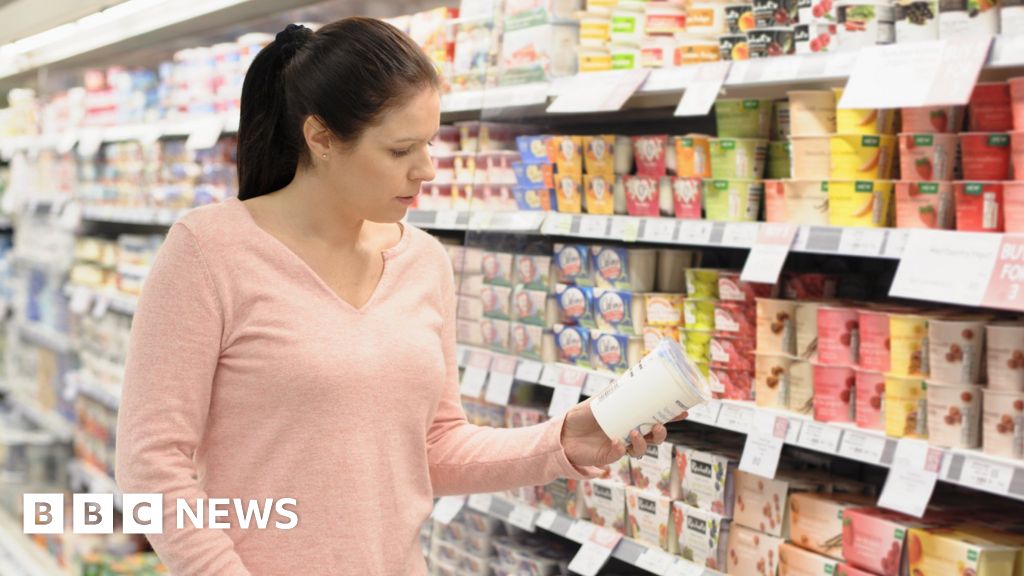

Why food bills aren't shrinking - five things to know
Prices in the shops remain much higher than a year ago, despite falls in energy and food costs.
www.bbc.co.uk
Food prices are 19% higher than a year ago. A grocery shop that used to cost £50 is now nearer £60.
That prompted the prime minister to hold a food summit at Downing Street, but it is still not entirely clear where the solution lies.
Last year the war in Ukraine pushed up the price of food and energy, but recently those prices have fallen sharply, so why haven't bills?
Here are five things that help explain what's happening.
1. Costs have been eye-watering - but some are easing
Russia's invasion of Ukraine prompted soaring grain, sunflower oil and fertiliser prices. Concerns over supply disruption triggered similar price rises for other foodstuffs.
The UN's food agency found that global wholesale prices for meat, dairy, grain, oils and sugar spiked by about 20% on average after the invasion - but those have since fallen back.
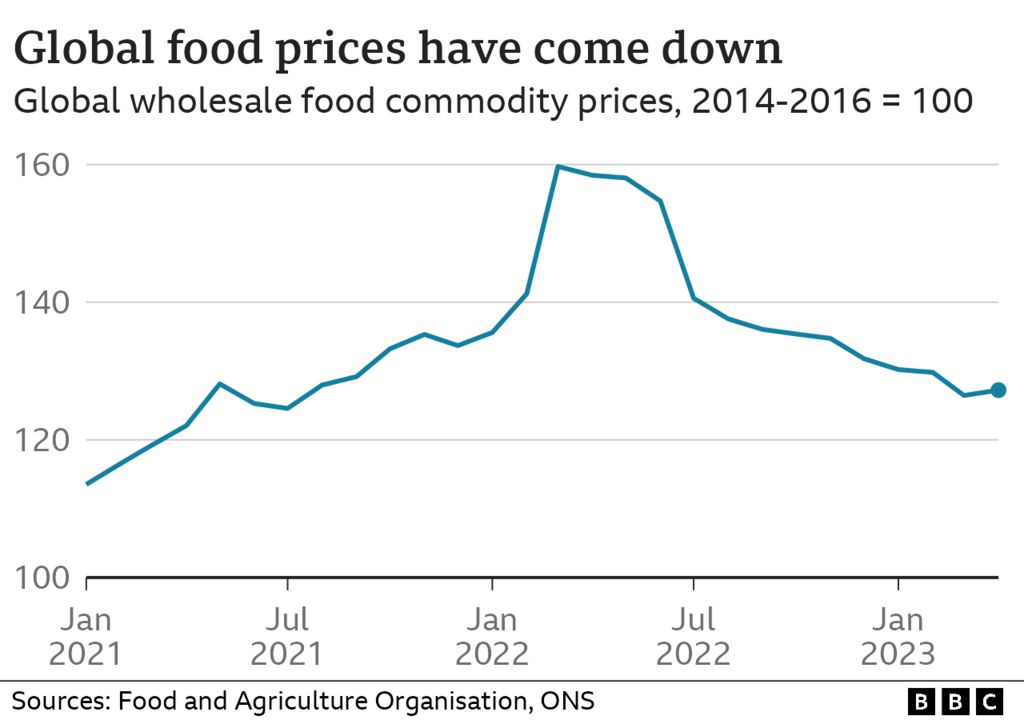
Food production and retailing are particularly energy-intensive industries. Some businesses, without access to the same level of government support as households, saw bills more than triple.
Staffing costs are the other big component for food producers and sellers.
The increase in the minimum wage, labour shortages across the supply chain exacerbated by Brexit, and the rising cost of living meant employers awarded staff pay rises of up to 9% over the last year.
2. Profit margins in the food chain can be slim
All parts of the food chain faced huge shocks when it came to their bills - but did they shoulder their fair share of the burden?
Much of our food chain operates with slim margins, so there's limited wiggle room.
Take a piece of cheddar costing £2.50.
In a study for food alliance, Sustain, academics from the Universities of Portsmouth and London claim farmers' costs account for nearly £1.50 while the retailers' and processors' overheads make up most of the rest.
They reckon that leaves 3.5p of profit to be shared, with the supermarket typically getting 2.5p (1% of the price) while the farmer gets less than a penny.
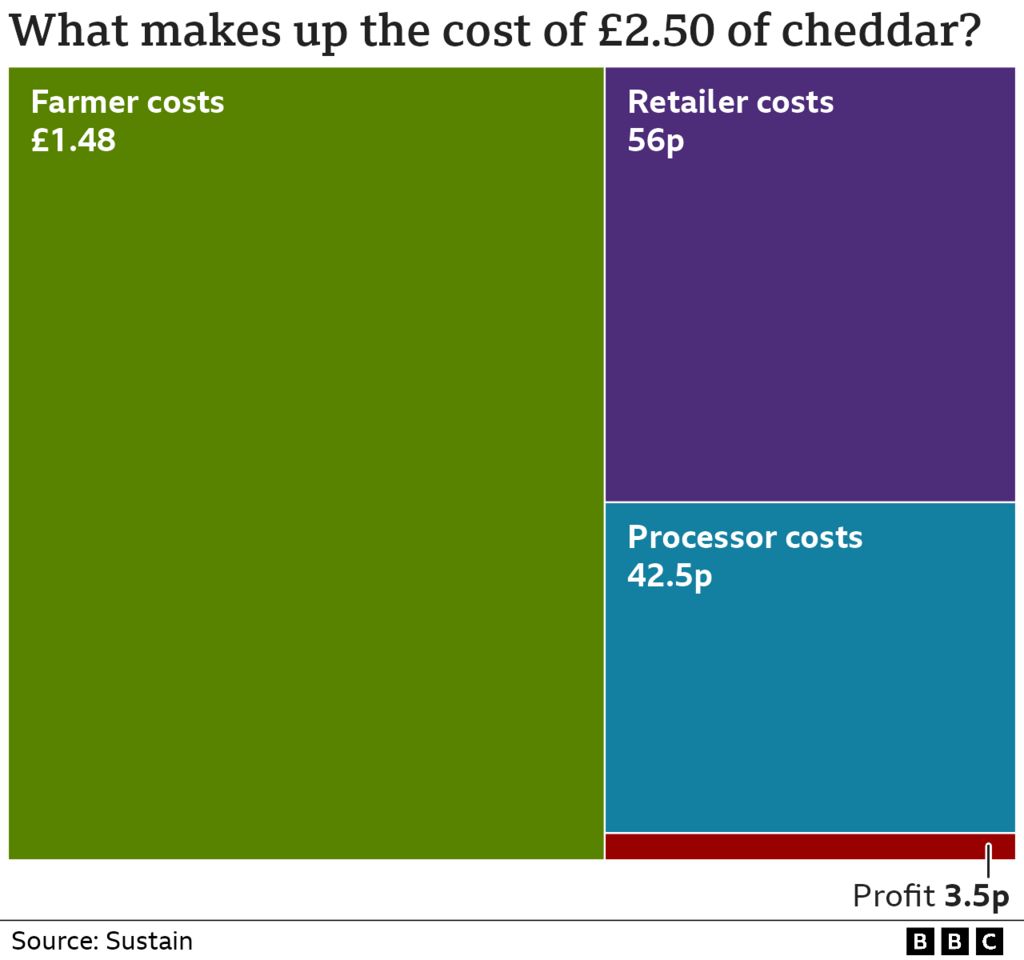
Arla, the dairy farmers' cooperative, says costs shot up by as much as 80% last year and absorbing those kinds of increases is challenging.
Profit margins on some items - particularly processed food and drinks - are bigger. Unilever, which makes Magnum ice creams, or Premier Foods, the maker of Mr Kipling cakes, may make 15p for each £1 of sales to retailers. As analysts say, the bigger the sin, the bigger the win.
The Unite union has accused the big supermarkets of profiteering, saying the three biggest chains saw total profits double compared with the period prior to the pandemic - but that was in 2021. Since then all parts of the food chain have been hit by unexpected cost hikes.
In total, supermarkets typically make around 5p of profits from each £1 of goods they sell - their profit margin. Last year, Tesco only made around 4p per £1, Sainsbury's closer to 3p.
3. Price changes take a while to travel from farm to fork
Supermarkets are keen to publicise the price cuts they're making for certain items such as pasta, dairy and oil. Those reflect lower costs, but why aren't we seeing bills falling overall?
It's often claimed that retailers are swift to put up prices, but drag their feet on passing on savings when they could be coming down.
However, contracts for goods and services are often agreed many months in advance, which means some producers and retailers will have fixed prices at the very high rates seen last year and they could be tied in to those for months yet.
IMAGE SOURCE,GETTY IMAGES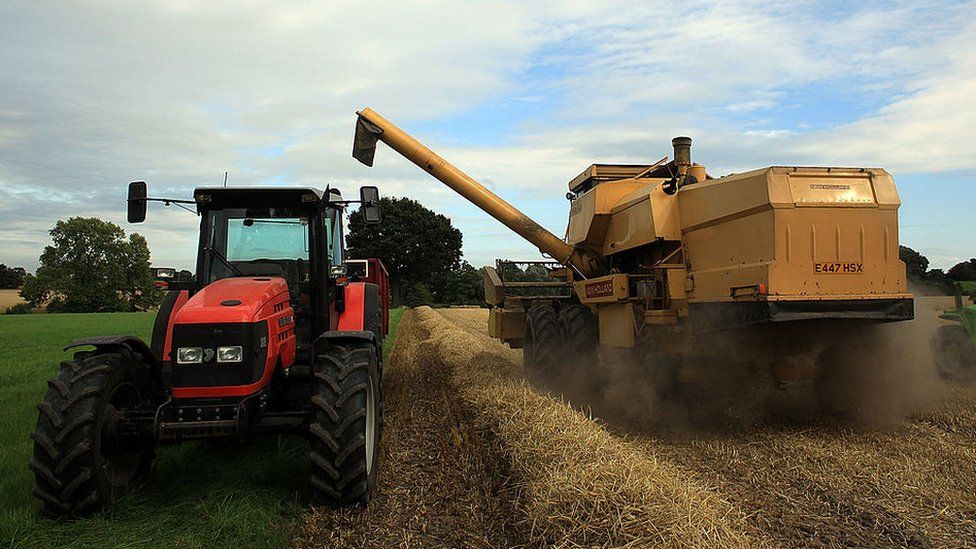
The good news is that the rate of wholesale inflation that food retailers face, though still high, is now slowing. That should feed through to smaller price rises on shelves - but it typically takes about six months.
We won't know, as many retailers and food suppliers only publish a breakdown of their figures annually, whether some have taken this opportunity to try and rebuild their profit margins. They're under pressure from shareholders to do so. But those figures will, when revealed, face close scrutiny.
4. Prices may be lower than in the rest of Europe
With Brexit adding to the red tape of importing food, are we paying more for our food than shoppers in the EU?
A study by economist Michael Saunders for research body Oxford Economics says not.
IMAGE SOURCE,GETTY IMAGES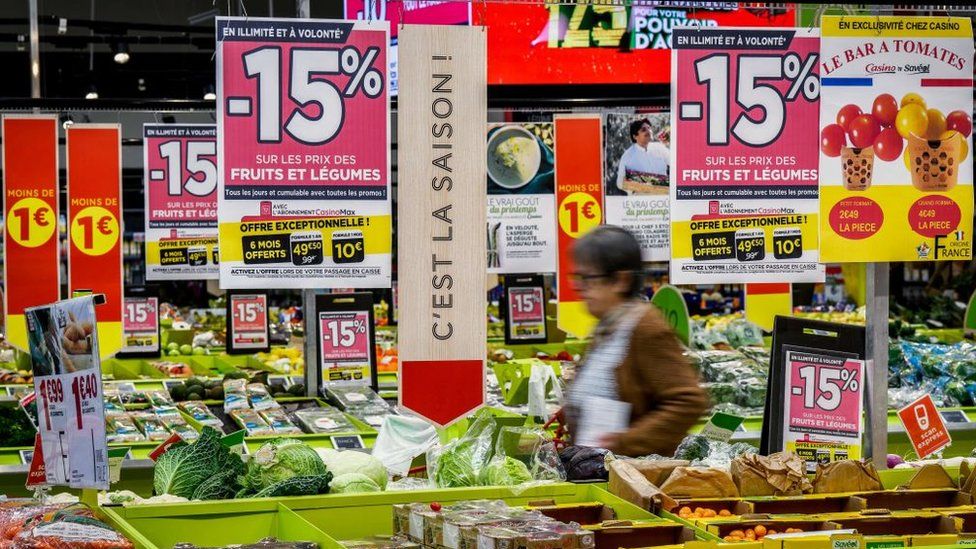
Looking at a range of food and drink, he says UK prices are typically 7% below the EU average - with bread, meat and fish in particular relatively cheap. He says the UK's competitive supermarket sector plays a role in keeping prices down.
By contrast, he says that prior to 2015, on average groceries were more expensive in the UK than in the EU - partly reflecting the relatively small influence of the lower cost retailers such as Aldi and Lidl at that point.
5. Smaller bills may not be on the horizon
By the summer, the Resolution Foundation think tank reckons households will have seen an increase in food bills of £1,000 since 2020.
While some items we buy may get cheaper, a return to the kind of smaller bills we saw prior to the pandemic seems unlikely.
Despite recent falls for some commodities the price for many things, from raw ingredients to energy, remain far higher than they were prior to 2020. And there could be other factors looming - the full range of checks and other formalities around food imported from the European continent have yet to be introduced, for example.
Moreover, with costs as they are, farmers are already leaving the business, while the number of food manufacturers collapsing has risen.
malc-c
Member
- Joined
- 1 Dec 2017
- Messages
- 995
Sure £1 wasn't the price for Asda's own-brand equivalent?
Been away for a few weeks, so late reply.
From my point it was that ASDAs own tomato sauce is very vinegary in taste. Hellman's tastes a lot better and at £1, was a lot cheaper than Heinz which was the only alternative brand on offer at the time. Recent visits to the store seems to confirm the comments about it being missing from available products. Tesco still carries it but it's now £1.85 !!
I often treat myself to a bar of ASDA's own Fruit and Nut chocolate that costs just £1.00, well it was until last week when it was priced at £1.25, just 10p cheaper than Cadbury's.
Herefordian
Member
however going only to the alcohol isle and then buying nothing is pretty suspicious...
It isn't. I often go into a shop just for a specific bottle of port or wine.
If they don't have the one I want, I'll go somewhere else.
I won't buy something I don't want. What's the point?
Depends on the shop, in a more upmarket shop it isn't suspicious but in Lidl going to an isle with items which have a much higher chance of shoplifting and then leaving without buying anything is fairly suspicious.It isn't. I often go into a shop just for a specific bottle of port or wine.
If they don't have the one I want, I'll go somewhere else.
I won't buy something I don't want. What's the point?
Lidl should have someone at least monitoring the cameras on the alcohol section though.
I have more issues with that in small shops. Often I will buy a chocolate bar or something cheap to avoid the awkwardness.Depends on the shop, in a more upmarket shop it isn't suspicious but in Lidl going to an isle with items which have a much higher chance of shoplifting and then leaving without buying anything is fairly suspicious.
Lidl should have someone at least monitoring the cameras on the alcohol section though.
Morrisons have a new loyalty scheme, which seems very similar to the old loyalty scheme but one,
'We have listened' - unfortunately not when it mattered, when people complained about the end of the previous points system. I, for one, am used to going elsewhere.
'We have listened' - unfortunately not when it mattered, when people complained about the end of the previous points system. I, for one, am used to going elsewhere.
Cloud Strife
Established Member
- Joined
- 25 Feb 2014
- Messages
- 2,336
About the article posted above about food prices in the UK being cheaper than in the EU: I can agree with this. The UK used to be horrendously expensive compared to Poland, but my last trip three weeks ago confirmed that prices are comparable and even cheaper in some cases. For example, Lidl sandwiches are cheaper in the UK than here. It was one hell of an eyeopener to realise that the exact same product was cheaper in the far wealthier UK.
londonbridge
Established Member
- Joined
- 30 Jun 2010
- Messages
- 1,660
Depends on the shop, in a more upmarket shop it isn't suspicious but in Lidl going to an isle with items which have a much higher chance of shoplifting and then leaving without buying anything is fairly suspicious.
Lidl should have someone at least monitoring the cameras on the alcohol section though.
During the pandemic when shops were regularly out of various lines I had managed to get a few bits I wanted in Sainsburys, I don’t usually use Lidl but thought “I’ll have to try in there”, went in, they didn’t have any of the other bits I needed, as I went to leave security called out “excuse me”, I realised he was pointing at the loaf of bread I was carrying so I said “it’s from Sainsburys” and carried on.
Herefordian
Member
Depends on the shop, in a more upmarket shop it isn't suspicious but in Lidl going to an isle with items which have a much higher chance of shoplifting and then leaving without buying anything is fairly suspicious.
Lidl should have someone at least monitoring the cameras on the alcohol section though.
I shop at Aldi. I've never been stopped for not buying anything.
If what I want isn't there, I'm under no obligation to buy something I don't want.
Many people just want to compare prices. Again, no obligation.
I don't see how either of those are suspicious.
Of course you don't have to buy anything, what makes it suspicious is going only to the alcohol isle where shoplifting is most common.I shop at Aldi. I've never been stopped for not buying anything.
If what I want isn't there, I'm under no obligation to buy something I don't want.
Many people just want to compare prices. Again, no obligation.
I don't see how either of those are suspicious.
Herefordian
Member
Of course you don't have to buy anything, what makes it suspicious is going only to the alcohol isle where shoplifting is most common.
I'd argue essentials like baby milk formula, nappies and sanitary products are shoplifted more.
If what someone wants isn't there, they leave. What else are they supposed to do?
Your argument doesn't make a lot of sense.
Possibly.I'd argue essentials like baby milk formula, nappies and sanitary products are shoplifted more.
I don't think its coming across very well. Just to be clear there is no problem buying nothing but walking straight to the alcohol isle and buying nothing is more suspicious than if you walked to say the vegetable isle and bought nothing.If what someone wants isn't there, they leave. What else are they supposed to do?
Your argument doesn't make a lot of sense.
Herefordian
Member
Possibly.
I don't think its coming across very well. Just to be clear there is no problem buying nothing but walking straight to the alcohol isle and buying nothing is more suspicious than if you walked to say the vegetable isle and bought nothing.
I see what you mean now.
I suppose it depends on the staff, really. My local Aldi and Tesco are fine.
I've walked to the alcohol section in both, left and never been stopped.
Baxenden Bank
Established Member
- Joined
- 23 Oct 2013
- Messages
- 4,287
No it isn't. It is perfectly acceptable to walk into a shop, look for an item, find it isn't stocked, or is normally stocked but the shelf is bare, or the product is cheaper elsewhere. That applies to fruit and veg, cheese, steak, baby disposables or alcohol.Possibly.
I don't think its coming across very well. Just to be clear there is no problem buying nothing but walking straight to the alcohol isle and buying nothing is more suspicious than if you walked to say the vegetable isle and bought nothing.
A couple of weeks ago I went into Lidl to check out their much promoted instore bakery, nothing I fancied so I left without buying any other groceries.
Last week I went into Aldi just to browse the centre aisle, there was nothing of interest so I left without buying anything. I did have a shopping bag with a box of lawn food in (from B & Q). Should I have registered my previous purchase at the entrance to avoid suspicion?
Today I went into B & M, it has a one-way layout where, having entered, you have to walk past about half the aisles before you have any chance to leave. I couldn't get what I wanted, I left without making a purchase.
Then I went to next door to Home Bargains, since my last visit a couple of weeks ago they had moved what I was looking for. As a result I was backwards and forwards, up and down all-over the shop until I found where they had relocated it to. Is that suspicious? As it happened they didn't have what I wanted so I left there also without making a purchase.
I often do trips to multiple shops with items purchased as I go along. It's how many people used to do their shopping rather than one big weekly car-based shop.
Iskra
Established Member
My experience in Southern Italy is that supermarkets there are relatively pricey, with local produce being cheap but anything imported being very expensive, but the best thing to do is buy direct from people with stalls at the sides of the roads, or even straight from the fisherman as they land on the beach. It's a different culture there, but the ability to buy direct saves a lot of money, but the downside is you have to buy whatever is in season.About the article posted above about food prices in the UK being cheaper than in the EU: I can agree with this. The UK used to be horrendously expensive compared to Poland, but my last trip three weeks ago confirmed that prices are comparable and even cheaper in some cases. For example, Lidl sandwiches are cheaper in the UK than here. It was one hell of an eyeopener to realise that the exact same product was cheaper in the far wealthier UK.
D6130
Established Member
Not really a downside TBH (IMHO). Fresh seasonal produce is the basis for the Mediterranean diet....one of the healthiest in the world!but the downside is you have to buy whatever is in season.
Iskra
Established Member
I enjoy it of course, but we are used to whatever we want, whenever we want it in the UK. Being told there are no fresh chilli’s because it’s not the right time of year is a bit of a shock to the system!Not really a downside TBH (IMHO). Fresh seasonal produce is the basis for the Mediterranean diet....one of the healthiest in the world!
I do very much enjoy a trip to the local (Italian) market to pick up fresh produce and just to look at it all and take it all in.
Imagine what only eating produce that’s locally available and in-season in the UK would look like- turnips thrice a day!
D6130
Established Member
Ah yes, turnips! We cut the tops off them and throw them away before boiling the roots to a pulp, mashing them and eating them with butter and pepper....while the Italians cut the leaves off the top, cook them in a delicate cheese sauce and mix them with orecchietti pasta - before throwing the roots to the cattle! Sorry....getting totally OT now. (Fresh chillies currently available in the shops here in Tuscany)turnips thrice a day!
Not really a downside TBH (IMHO). Fresh seasonal produce is the basis for the Mediterranean diet....one of the healthiest in the world!
Wine is always in season
In the U.K., we have the most efficient food distribution system in the world, hence the comparative cheapness and the wide variety of products on offer.
